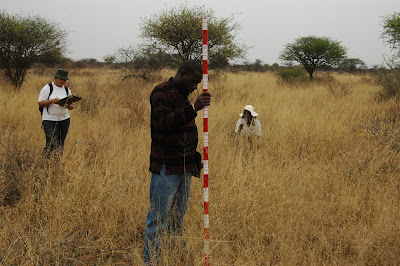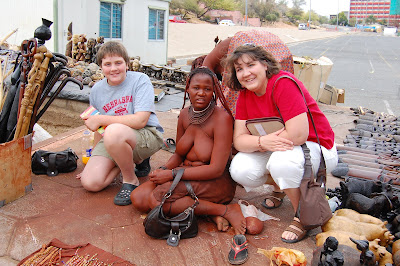You are rewarding a teacher poorly if you remain always a pupil.--Friedrich Nietzsche
I think if you talk to any teacher, they will tell you about a teacher or teachers who inspired them to enter the academic profession. And, by the time you go from kindergarten to a graduate degree, you have a lot of examples to learn from. It has been a most rewarding experience to interact with my colleagues at Polytechnic this year. Just more people to watch and learn from.
My teaching colleagues in Namibia do an excellent job and they work very hard. My
previous post shares some things that have enhanced my understanding of education. This post is harder to write...as it is about the things that I will be satisfied to leave behind. Perhaps I shall put a positive spin on the list--these are things that I have learned to appreciate about teaching in the US. The list reinforces my appreciation for my Namibian colleagues, as they are working in a system that is not always built to enhance their efforts.
Flexibility of course schedule:My courses in the US are designed around units that provide material to meet course objectives. Each unit ends with a test or group project assignment. The dates for the tests and projects are up to me as I design the course. At Polytechnic, as in most of southern Africa, test dates are prescribed before the semester starts and you must fit your teaching around the dates given to you.
Autonomy of faculty:In Nebraska, my course is designed to fit into a curriculum. But, when the course is taught, I design the course, I teach the course, and I assess the students. In southern Africa, there is a history of corruption in the educational system--so, the method that has been developed to address corruption is the Moderator System. Each course has a lecturer who teaches the course, and there is also an outside Moderator assigned to the course. At Polytechnic, these are often professors from South Africa or professionals with expertise who live in Windhoek and work for the Ministries or other businesses. The final exam has to be written one month before the end of the course, and the exam is submitted, with the Memo (the list of acceptable answers to the questions), to the Moderator. Now, the moderator has never set foot in the classroom, and often is unaware of any goals of the course or the curriculum. But, they must approve the final exam. When the exams are marked, they are also sent to the moderator, who may disagree with the number of marks given to a student for a particular answer. This, of course, would make most of my colleagues in Nebraska resign in protest. But, it is an interesting lesson about the effects of culture and politics on education. It is all designed to combat corruption.
Advanced planning:I received my teaching assignments at Polytechnic about 1-2 weeks before the semester started. It happens that way for every lecturer every year. Most people have a good idea what they will be teaching, but there are surprises. It makes for grumpy people and prevents any kind of advanced preparation for the course. In contrast, my department at University of Nebraska just sent out the first draft of the teaching schedule for Summer session 2010 (about 8-9 months in advance). Sometimes we groan about the advanced planning, but I can attest that the opposite system should not be desired!
Choosing the ink of my choice:A colleague at University of
Dubuque once told me that red ink has a harsh effect on students, and they will not learn as well from their mistakes as they would if you use green ink. Although my colleagues at Polytechnic think that shows how we pamper students in the States, I like the option to use whatever color of ink I want to mark/grade papers/exams.
Polytechic's rules are: red is for the lecturer to mark (and only red), green is for the moderator to make their marks and comments. You never use blue or black ink to mark papers (it kind of makes sense because students write in those colors). But, it is outlawed. Polytechnic also has a rule about signing contracts in black ink. I signed a little contract for my distance course using blue ink, and it was sent back to me.
Flexibility of assessment methods:The rigor that I reported about in my last post has one drawback. Lecturers love to give tests that assess individuals. Some are interested in other methods of assessment, and I've worked with some to develop problem-based cases in their courses. My courses in Nebraska often include one or two group projects that are graded. Group work is discouraged here, because "it's hard to know who did the work". It is true that the bane of group work for a teacher is that it is hard to do individual assessment. But, to teach problem solving and critical thinking, and to prepare students for the real work (where they will work in groups and the boss doesn't care who did the work--just that it got done), group work seems to be important--in my book, at least. Every course at Polytechnic (and U. Namibia) is required to have a final exam, where students sit for 3 hours and write the exam 'paper'. There is no option to use a term paper, a group project, or other means of assessment. I think this will change in the future, as there are glimmers of hope among lecturers who want more flexibility. But, the exam/test system is really
ingrained in the culture here.
Students who have textbooks and other resources:The biggest problem with teaching in southern Africa is that many students can't afford to purchase the prescribed text. Each course has one, but no one really expects the students to purchase the text. Instead, lecturers often prepare a study guide that condense the textbook (or in some cases actually contains copied pages from the textbook...), and the study guide is sold to the students. Some can't even afford that. So, a lecturer always has to remember that the students really haven't read the chapter before coming to class...and never will. It really makes the quality of the lecturer critically important, doesn't it? They are the only resource for many of the students.
Virus free computers:I had no idea how good the virus protection systems in the US were, until my first week teaching at Polytechnic. I took a
powerpoint presentation to the computer in the classroom, and loaded it for a lecture. Students asked after the lecture if they could copy it, which is a common way to share the information (remember, no text books). Well, because that process had happened before, when I took my memory stick back to my
UNL laptop, alarm bells went ringing....I had about 8 viruses just from that one
incident. I had a student come by my office this week, and she wanted to print out her assignment for another course--she couldn't afford the printing fees to print it elsewhere. So, I took her memory stick and stuck in in my computer. Ding, ding, ding. At least 25 viruses were detected. Students who have access to computers at home do not have additional money to purchase Norton Protection! Polytechnic faculty often have their computers crash because of viruses, and there is an office on campus where students can stop to 'clean' their memory sticks before bringing them to class or to a lecturer's office. When I arrived at Polytechnic, the school was using a free, share-ware virus protection system. They've since upgraded it. But, wow.
Finality of the semester's end:This one may seem strange. But, the system in place throughout much of southern Africa allows a student to take a final exam 4 times. But, you can only take it once each semester. So, it is possible for a student to be re-taking a final exam two years after the course ended. It works like this...the final mark (percentage--no A's B's or C's here) is a combination of the semester marks and the final exam mark. But, you can't pass a course without passing the final exam. So much for our
UNL students who flunk the final but still pass because they've done well during the semester. At Polytechnic, you would have failed the course. You come back for 'second chance' exam at the end of next semester. Now, this exam will be 'similar' to the first exam, because it was written by the same professor who taught your course and gave you the first exam. In fact, lecturers have to submit BOTH exams (the first and second-chance) at the same time to the moderator. But, the crazy thing is what happens after the second-chance exam. Let's say you flunk that one, too. Well, someone else may be teaching the course the next year, so that person will write your third- or fourth-chance exams. It is possible that the person will cover completely different material in the course! And, the student doesn't attend the course--they only show up for the final exam. Not only does this seem quite odd from an educational perspective, but it makes it very hard for the Registrar to record all these grades. It makes it hard to interpret an academic transcript. And, it makes it hard for lecturers who have to remember whether they have a student from a previous year coming to take the exam. The nice thing for the University is that students pay Exam Fees. So, by failing the students, the University can make more exam fees...
I hope these topics provide a glimpse into a different system of education. It's a system in transition from a system built to prevent corruption. And, it has its roots in an English system of examinations. My experiences at Polytechnic have been eye-opening in many ways, and I've learned a lot by participating in the department. I've learned that I had many assumptions about how education 'had to be'. Perhaps some of my methods have rubbed off on my colleagues and vice
versa. It's the only way to move forward, on both sides of the Atlantic.














